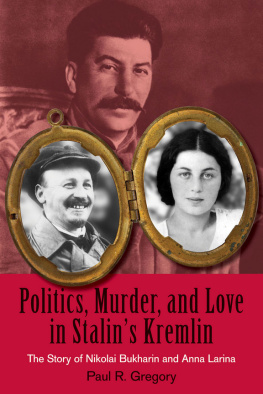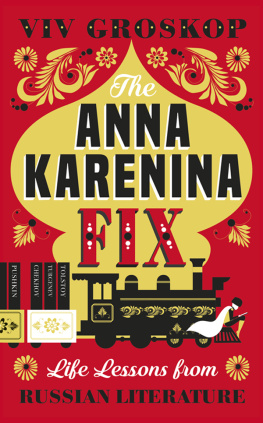PUBLISHED BY NAN A. TALESE
an imprint of Doubleday
a division of Random House, Inc.
1540 Broadway, New York, New York 10036
D OUBLEDAY is a trademark of Doubleday,
a division of Random House, Inc.
All of the characters in this book are fictitious, and any resemblance to
actual persons, living or dead, is purely coincidental.
LIBRARY OF CONGRESS CATALOGING-IN-PUBLICATION DATA
Dezhnev, Nikolai, 1946
[V kontsertnom ispolnenii. English]
In concert performance: a novel / Nikolai Dezhnev: translated
from the Russian by Mary Ann Szporluk.
p. cm.
I. Szporluk, Mary Ann. II. Title.
PG3479.6.E98V213 1999
891.7344dc21 99-20438
eISBN: 978-0-307-81599-6
Copyright 1995 by Nikolai Dezhnev
Copyright 1995 by Vagrius
Translation copyright 1999 by Doubleday, a division of
Random House, Inc.
All Rights Reserved
v3.1
LIST OF CHARACTERS
KOVALEVSKAYA an old Bolshevik, Anna Alexandrovnas aunt
TELYATNIKOVA , Anna Alexandrovna (Anka, Anya) director of a TV news program, Sergei Sergeyevichs wife
TELYATNIKOV , Sergei Sergeyevich (Serge, Seryozha) assistant professor of physics, Annas husband
LUKARY (Luka, Lukin, Lukash) an evolved human, who is sent back to earth to Moscow as a domovoi (hearth spirit)
SHEPETUKHA , Semyon Arkadievich (Syoma, Sem) by nature a leshii (forest spirit or goblin)
MARIA NIKOLAYEVNA (Masha, Mashka) Anna Alexandrovnas friend
DIOGENES of SINOPE Greek philosopher of the Cynic school
MILADY (Lucy) an apparition, resembling a rusalka (water sprite)
YEVSEVY childhood friend of Lukins, later an inmate in an insane asylum
SERPINA childhood friend of Lukary and Yevsevy, senior privy councillor in the Department of Dark Powers
NERGAL also the Black Cardinal, Serpinas superior in the Department of Dark Powers
BUROV , Nicholas (Kolka) a shepherd
TELYATIN , Sergei Sergeyevich a physicist in Moscow in the 1930s
ANNA ALEXANDROVNA (Anechka, Anyuta, Anya, Anka) his niece, an actress
LYUDMILA NIKOLAYEVNA (Lucy) a prostitute, the Telyatins neighbor
| RED |  |
| SLANT-EYE | gang members |
| SAILOR |
GRISARD gang leader
ZAKHAVA , Boris Yevgenievich stage director
AKIMYCH studio head at the theater
SHCHUKIN , Boris Vasilievich actor
SERPIN secret police investigator in 1930s Moscow
ERGAL Serpins superior, member of the Central Committee
SHEPTUKHIN informer for the secret police
EVGENIA IVANOVNA a nurse in Moscow
ANAEL an angel
LUKIN a historian in contemporary Moscow
NERGAL editor-in-chief of the journal of the Academy of Sciences
ANNA Lukins wife
SERPINOV member of Parliament, friend of Lukin and Yevsei
YEVSEI a friend of Lukin and Serpinov
MASHA Annas friend
LUCY a colleague of Mashas
Contents
In March , during the first days of spring, the old woman Kovalevskaya died. Some might say she made up her mind and then died, but had she been alive Kovalevskaya would never have agreed. Shed been a member of the Communist Party since 1932 and didnt believe in mysticism. She had spent her life in the objective world of matter, perceived through the senses, and it was proper for death to come to her in an equally simple and lucid way. May our dear country live on, Kovalevskaya had sung along with the rest of the people, and the country lived, but she never aspired to such a luxury for herself. She didnt have timeshe was too active in the struggle. And even though her husband, a fellow Party member, went to the grave straight from prison, and even though she had never made any distinction between personal life and civic duty, Kovalevskaya had an unconquerable thirst for life, a childish interest in its absurd and exhausting process. She kept her sharp analytical mind into old age; she read all the newspapers she could get and understood the fine points of the confusing political situation, which significantly contributed to her untimely end, by the way. When youve been accustomed to clear-cut goals and predictable events your whole life, its hard not to lose your mind when you encounter the madness mistakenly called modern-day politics. The old woman couldnt bear it. On the day of her death Kovalevskaya listened to the morning edition of the latest news and then she phoned Anna, her only relative, and dryly informed her that she would probably die soon.
Later, it became clear that she had no longer trusted the state and had bequeathed her only property, a two-room apartment, to her niece. Kovalevskaya looked tall and withered in her coffin, wearing the same calm and stern expression shed had while alive. Frank to the point of rudeness, she had made few friends. Some six or seven people came to bury the old Bolshevik, all equally severe and stiff, dressed in modest but clean clothes in the style of the fifties. The painful job of funeral arrangements fell to Anna AlexandrovnaTelyatnikova by marriageand partly to her husband, Sergei Sergeyevich, though he was extremely busy at his institute. The deceased was buried in her husbands plot in Vagankov, and afterward a service was held in the church there.
Snow fell abundantly that year; it lay in ragged drifts on the roof of the kiosk with pictures of Vladimir Vysotsky and on top of the hall for civil ceremonies; it covered all the small side paths leading off the cleared avenues. The mourners made their way to the grave through a maze of fences, trying to stay in the track of footprints ahead. Tired out, the gravediggers from the state funeral agency demanded one more bottle of vodka than theyd agreed on earlier. Quietly twilight began to fall. The gray mist of the bleak Moscow thaw thickened between the bare branches of the trees. The mourners returned the same wayin single file. When they reached the central avenue, Anna shook the snow off her coat, and as she cast a farewell glance at the distant fresh grave, she saw a tall man with a wreath in his hands standing beside the dark mound. Anna was bewildered.
She left the old people to her husbands care and went back. She felt obligated to invite the stranger to the wake, but oddly enough, when she reached the grave no one was there. Nor were there any footprints, except the ones the funeral procession had made. There was a small wreath of fresh red roses tied with a black ribbon on which someone had carefully written in old-fashioned script: We got along well. All the way home, shaking in the cold half-empty bus, Anna couldnt stop thinking about what shed seen, but she didnt tell anyone about it.
There was little drinking at the gathering; instead the old people all reminisced about their youth, their work in the prewar state agencies, and the war itself. They criticized the decline of public morality and the lack of ideals among todays youth. But they didnt complain about the constant rise in pricesthey were above that. The old women smoked. The only man among the survivors watched everything in wonder with lusterless moist eyes and was silent. The fork in his hand trembled slightly. Anna sat pensively at the table. From time to time she looked up at the photo of her aunt on the sideboard in a black frame, and strange thoughts began to float in her head. She wasnt picturing the life of the deceasedit was the man at the cemetery who occupied her imagination, and it seemed to Anna that not only did she know this man butand this was completely absurdhe was near and dear to her. A strange languor came over her and touched her heart with a presentiment of joy and a fullness of life which seemed out of place at a wake. But she didnt want to let go of this sensation, so like a sweet morning dream full of hope and promise.











